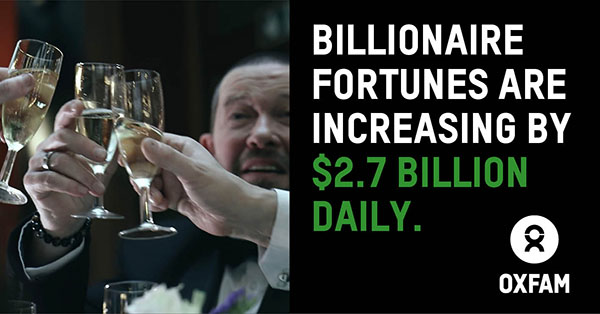by Lewis Ryder-Jones, Oxfam Scotland Advocacy Advisor
We are living through an unprecedented era of simultaneous crises, and it is clearer than ever that we are not all in this together. For the first time in 25 years extreme wealth is growing at the same time as extreme poverty.
The very richest have become dramatically richer, and many corporations are posting record profits. The world’s wealthiest are not just sheltered from the misfortunes of the majority, they are gaining from it.
A new Oxfam analysis shows that globally the richest 1 per cent – those with over $1 million – grabbed almost two-thirds of the $42 trillion of new wealth created in the last two years. Meanwhile, at least 1.7 billion workers live in countries where inflation is outpacing wages, resulting in real terms pay cuts. In just the last 10 years, the number and wealth of billionaires has doubled.
When the majority of us are living through a cost-of-living crisis and roughly one in ten people across the world are going hungry, this acceleration of wealth at the top must be seen as a sign of economic sickness, not economic health.
Alongside the global billionaire bonanza, the wider wealth gap within the UK and in Scotland is also vast.
UK-wide, the richest 1 per cent hold more wealth than 70 per cent of the rest, while the four richest Britons have more wealth than 20 million of us put together.
There are fewer super-rich in Scotland, but the latest data suggests that, on average, the richest 10 per cent of households still have a staggering 217 times more wealth than those in the least wealthy 10 per cent.
The Scottish Government has a goal to share wealth more evenly, but there has been barely any progress to cut wealth inequality since tracking began in 2006. In fact, wealth inequality has grown in recent years.
Wealth won’t trickle down because the truth is that our economies – not just at home but across the world – have been designed this way. The crises facing people and the planet are a symptom of that design.
It doesn’t have to be this way, and there is a solution: fair tax. It is time for a systemic and wide-ranging increase in taxation of the richest people to claw back crisis gains driven by public money and profiteering.
Oxfam’s new report Survival of the Richest shows that an annual wealth tax of up to 5 per cent on the world’s millionaires and billionaires could raise $1.7 trillion a year, enough to lift two billion people out of poverty.
Fairer tax, particularly on wealth and carbon, is essential to tackle economic inequality, to invest in key priorities like undervalued care services and workers, and to confront the climate crisis.
Taxes on the wealthiest used to be much higher. Over the last 40 years, governments across the world have slashed income tax on the richest while upping taxes on goods and services, disproportionately hitting those on low incomes and exacerbating gender inequality. We need to relearn the lessons of our own history.
No longer can governments standby and leave people to face the injustice of poverty.
The UK Government should use its powers to ensure the richest pay their fair share, but the Scottish Government should not wait to act either.
Despite proposing some welcome tax tweaks in the recent Scottish Budget – including asking those on higher incomes to contribute a bit more through Income Tax – it did barely anything to address wealth inequality, nor to make polluters pay for their climate damage. Timidness on tax won’t be enough.
Scottish Ministers must now kick start meaningful tax reform. It has a range of options available, including the ability to propose new national and local taxes. The current inaction is a choice.
All governments must be bolder on tax to turn back the tide of inequality.
This article originally appeared in The Scotsman.
